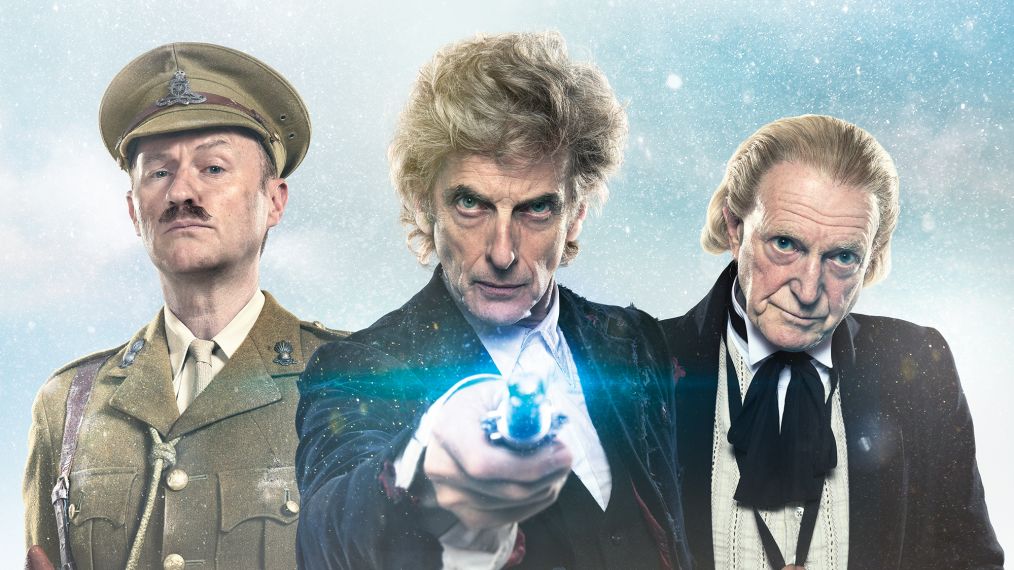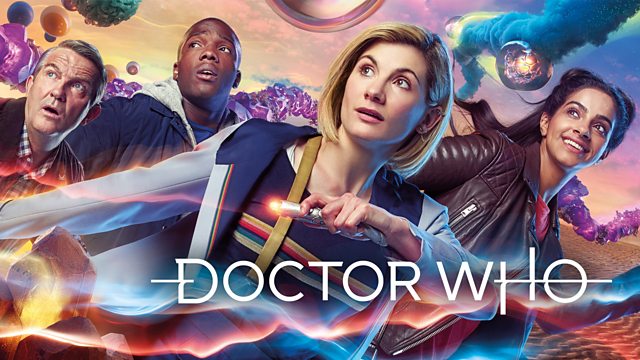The Moffat era of Doctor Who is probably best described as ‘divisive’. While it’s had its moments- the touching Vincent & The Doctor, the creative and charming Flatline and the poetic Heaven Sent, amongst others- it has a large number of fundamental flaws, the biggest of which (to say nothing of Moffat’s seeming inability to create companions with lives outside of the Doctor, glorification of the Doctor and his actions through overdramatic speeches about how amazing he is, and an inability to balance the childlike charm of the Doctor with seriousness nearly as well as the Ninth and Tenth Doctors did) is his inability to resolve his arcs satisfyingly. He’s great at implying something amazing might happen soon, but when the time comes to deliver, he can’t give us anything as satisfying and engaging as The Parting Of The Ways or Doomsday.
Back in January, this problem caused Moffat’s other popular drama Sherlock to come crashing down as the ludicrous ineptitude of what seems likely to be its last episode, The Final Problem, proved inexcusable to the point that its defenders invented a secret episode that would, if it existed, fix it. While Moffat Who has never quite fallen so low, I for one was very disappointed by the Series 10 finale The Doctor Falls, especially after the first part, World Enough And Time, genuinely impressed me with its excellent portrayal of the horror of the Cyberman conversion process.
So admittedly, I come not to praise Stephen Moffat but to bury him. But even leaving all that aside, more power to you if you enjoyed Twice Upon A Time. For me, though, it was pretty much the Moffat era in a nutshell- a few small bright spots hidden under an almost all-consuming cloud of frustrating self-aggrandizement.
It starts by giving a retrospective of the Doctor needing to regenerate in the final First Doctor story, The Tenth Planet, briefly features a re-enactment of the ‘wearing a bit thin’ and ‘it’s far from being all over’ scenes (with the former incorporating the pre-regeneration glow Moffat invented for Capaldi’s regeneration) before having the First Doctor (as played by David Bradley in a reprise of sorts of his excellent turn as William Hartnell in the 2013 dramatization of Doctor Who’s origins, An Adventure In Space And Time) randomly bump into the Twelfth, with time being frozen by an entity known as the Testimony so we can account for the continuity ludicrousness- sorry, I mean so that it can correct an error in time which affects a soldier in the First World War (played by Mark Gatiss) who is about to die, inadvertedly moving him into the Doctors’ time stream before taking all of them to its own hivemind. Seeking to take them down, accompanied by the Doctor’s former companion Bill (in a way- it’s a reconstruction of her ‘memories’, and occasionally turns into one of those robot things from the Boom Boom Pow music video so the show can trick us into thinking the Testimony are traditional monsters), the Doctors and the solider go to the centre of the universe to try to convince ‘Rusty’ the Dalek, from the series 8 episode Into The Dalek, to help him find out what it is.
Credit where credit’s due, I love the design and direction of this episode. The First Doctor’s TARDIS is wonderfully recreated both inside and out, the hivemind of the Testimony is a neat, atmospheric setpiece, and both the planet on which Rusty has holed itself up and the facehugger-like monsters that inhabit it have cool designs, even if they’re not the most creative.
It’s also worth noting that there are some good performances, as you might expect with actors as talented as Peter Capaldi and David Bradley, both of whom give it their all in spite of the terrible script, but it just makes me desperately sad they’ve hardly gotten to shown their talent as Doctors. Ironically, my attitude to Gatiss is pretty much the opposite: the idea of his character is nice- a First World War soldier who realizes the humanity of war when he witnesses the 1914 Christmas truce- but he just can’t sell it. He plays the ‘stoic Tommy’ archetype in far too silly a way, to the point it wouldn’t have been out of place for him to be a character in Dad’s Army or Oh! What A Lovely War. The revelation he’s an ancestor of Brigadier Lethbridge-Stewart did rise above the mess of nostalgic references because it actually makes a little logical sense, his comedic stoicism mimicking that of the Brigadier himself, but it doesn’t retroactively make him much better, especially when the bulk of jokes were at his expense rather than reflecting that stoic nature.
Speaking of jokes at characters’ expenses, the First Doctor is written very out of character. While the elements of coldness and self-preservation were certainly facets of his personality when the show began, this is the First Doctor as he was just before regenerating. He probably wouldn’t be so unready to regenerate, and definitely wouldn’t make all the outmoded or offensive remarks he does- it comes across as if Moffat somehow conflated the First Doctor with William Hartnell himself, which is ludicrous. (Granted, the ‘smacked bottom’ joke is based on a line from The Dalek Invasion Of Earth, but that was directed at his enemies. Having it be directed at the Doctor and Bill doesn’t work.)
To me, at least, Twice Upon A Time reads almost like a fan fiction, which is fitting considering Moffat’s last act as head writer on the show is to call back to the final First Doctor story, The Tenth Planet, and incorporate the First Doctor into the narrative for frankly tenuous reasons. What’s frustrating is that Moffat either doesn’t seem to understand that compelling drama can be part of a Christmas special as well as cheerfulness, even in a drama, or- worse- mistook this episode’s continuity obsession for ‘compelling drama’.
If anything, that leads me to the biggest problem of this special: its approach to referential writing is the same approach Family Guy and The Big Bang Theory take, namely ‘This exists, therefore you should care!’ Compared to, say, Star Wars: The Last Jedi, which cleverly used the existing rules and continuity of its universe to subvert the audience’s expectations, Twice Upon A Time is far too basic. While 2013’s The Day Of The Doctor had its issues, I still enjoyed it for not only having more of an excuse to be nostalgic by virtue of being Who’s 50th anniversary, but because it actually delved into the Doctor’s past in a meaningful way and gave us a better insight into the Time War story, letting us see his guilt and fleshing out a period of his past that was shrouded in mystery.
Ultimately, the story’s core being made of nostalgia means it doesn’t understand the point of its own story elements. The First Doctor is in it because fans like it when old Doctors are brought back and Moffat gets to recycle his old ‘Doctors bickering’ material from Time Crash and The Day Of The Doctor. Bill is in it because Moffat thinks that further complicating the already absurd story of her dying and then getting with Heather after death will fix it and give it an emotional weight, when in reality it was absurd because Moffat wasn’t brave enough to actually let the Doctor fail and a companion die. Moffat brings back Rusty and puts him on a planet that looks like Skaro because fans think Skaro is cool and Moffat wants to use Rusty again, even though no one cares about him. Clara, Bill and Nardole get to be in a trite farewell sequence because Moffat apparently forgot so many people hated it when Russell T Davies did one in The End Of Time and wanted people to get emotional now that he’s leaving (all it did for me was annoy me for reminding me of Hell Bent and for having Bill kiss the Doctor- sure, it’s platonic, but given Moffat’s obsession with companions kissing the Doctor, it left a rotten taste in my mouth).
Again, I do have to admit to liking the concept of the Testimony just wanting to preserve people, but the idea not only makes no coherent sense (why do they let Lethbridge-Stewart survive even though he was supposed to die in the trench on Christmas Eve, and let the First Doctor keep the memories of meeting the Twelfth?), but series 8’s Dark Water/Death In Heaven already did Moffat’s conception of Heaven, the ‘people are just memories’ concept is almost sociopathic (should we just ignore the ideas people have or the actions they undertake? If someone is forgotten by most, are they not worth existing?), and the ‘ambiguous villain’ idea smacks of Moffat just doing the same kind of thing he did with Listen, Heaven Sent, and The Pilot.
Finally, almost everything about Capaldi’s regeneration scene aggravated me. He wanders round the TARDIS going on about what he’d want his future self to be like in the exact way that proved so tedious and obnoxious in series 9, and featuring such nuggets of wisdom as ‘hate is always foolish and love is always wise!’ I could just imagine the endlessly regurgitated Facebook posts copying it all out as he recited it. Admittedly, this isn’t really Capaldi’s fault; as mentioned, he’s an excellent actor who’s been constantly let down by the forgettable scripts of his era; but even so, I just couldn’t feel any of the emotions I knew the show was trying to entice.
Worse still, he waffles on for so long I don’t even remember his final words. Four got “It’s the end, but the moment has been prepared for”; Ten, “I don’t want to go”; Eleven, “I will always remember when the Doctor was me”... all manner of snappy, memorable final words. Sure, Six got “Carrot juice, carrot juice, carrot juice!” but at least that wasn’t by design. But Twelve? I have no idea, it was lost in the final flood of pretentious twaddle.
Most insulting of all, though, is that anyone hoping for a nice moment with Jodie Whittaker’s new Thirteenth Doctor comparable to ‘Barcelona’, ‘Geronimo’ or ‘do you know how to fly this thing?’ will be sorely disappointed. She gets one line- one word- before being sucked out of the TARDIS entirely. That’s certainly going to shut up all the idiots complaining about the Doctor being a woman.
I’m sorry I’ve gone on so long about the problems I see with this special, and I totally understand and respect it if other people got more out of it, but to me, there was so much potential that wasn’t just untapped, but seemingly invisible to almost all concerned.
If I could give one piece of advice to Whittaker and incoming head writer Chris Chibnall, it would be this: don’t assume that people will love Doctor Who just because it’s Doctor Who. I love this show for what it’s done in the past, and how much potential it has to be clever, affecting and deep- I only have to watch something like City Of Death, or The Caves Of Androzani, or Remembrance Of The Daleks, or Dalek, or Blink, or Turn Left, to remember that this show can produce some of the best television I’ve ever seen. But for years, it’s been digging itself into a deep hole with mediocre episodes, bland characters and vacuous continuity.
I want to believe Chibnall knows this is a problem, and that the new series will do something radical. But I can’t say I’m hopeful.
By Tim Barham
All pictures belong to their respected sources and owners
Picture Reference: http://www.denofgeek.com/us/tv/doctor-who/266048/doctor-who-christmas-special-2017-trailer-release-date-story-details-cast-more
By Tim Barham
All pictures belong to their respected sources and owners
Picture Reference: http://www.denofgeek.com/us/tv/doctor-who/266048/doctor-who-christmas-special-2017-trailer-release-date-story-details-cast-more








COMMENTS